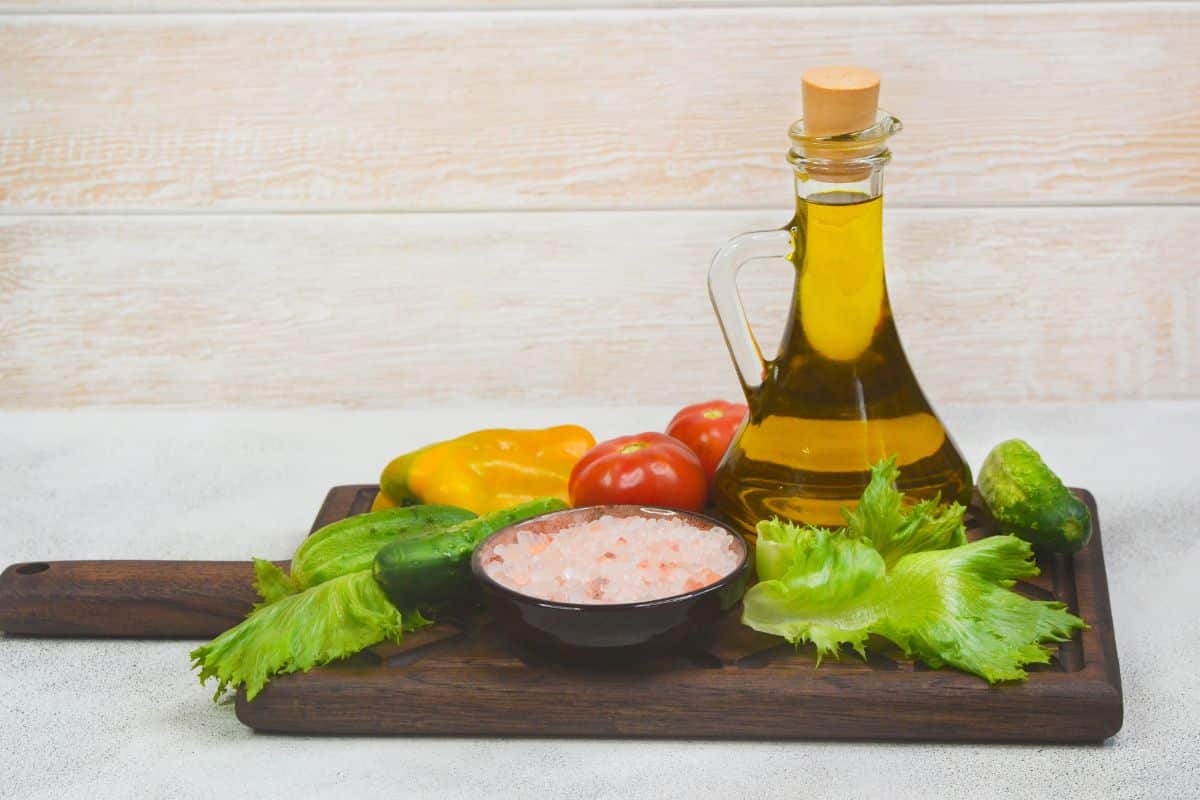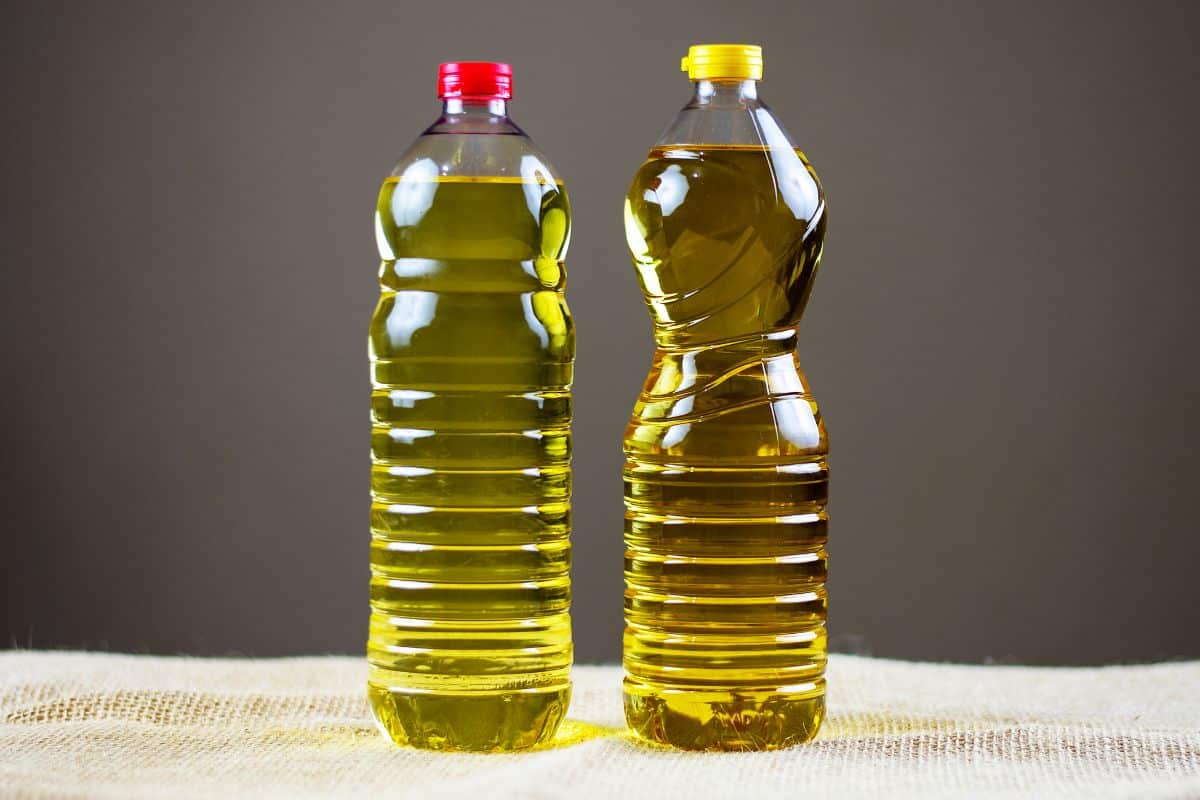Say you’re making a recipe that involves vegetable oil, but have realized that the bottle in your pantry is a few months over its expiration date.

You may wonder whether this oil is safe to use, or should you throw it out and buy a new bottle?
Essentially, you’ll want to know, how long does vegetable oil last?
Some people believe that oils don’t spoil, but this isn’t true. Oils, like vegetable oil, will have a shelf life. Using expired oils in cooking or baking can make you ill, depending on how old the product is.
You’ll find out more about vegetable oil and its shelf life in this post, including how to tell if your oil has spoiled and how to store it properly.
About Vegetable Oil
Before we get into its shelf life, it’s important to understand what vegetable oil is.
The term ‘vegetable oil’ covers all oils that are part of the vegetable family. There are lots of different examples which range in popularity.
Avocado and canola oil are popular kitchen items, while mustard or poppyseed oils are more obscure. Some oils sourced from nuts and fruits can be classed as vegetable oil as well.
However, if you’re purchasing a product called ‘vegetable oil’ from the store, it’s easy to know what’s inside the bottle.
For the most part, you’ll either be purchasing processed canola oil, soybean oil, or another type of popular, yet affordable oil.
This vegetable oil will likely be refined. This means that the oil will have been treated with additional processing methods.
This gives the product a neutral taste and smell, with a moderately high smoke point. Oils with higher smoke points are better for deep frying and cooking.
With this in mind, canola (or soybean) oil’s shelf life will apply to vegetable oil as well. Some types of oils will have a greater life span as a result of their chemical properties, or the way that they are stored.
Can Vegetable Oil Expire?
Now that you know more about vegetable oil, we can get into its expiration and shelf life. Vegetable oil can spoil when it is kept in unsuitable conditions or stored for a long time.
Signs that vegetable oil has spoiled include a bitter, sharp taste, or a smell like old paint, nail polish remover, or putty.
Sometimes, it can be harder to tell if the oil has spoiled through smell, but it’s easier to do so through flavor.
Rancidification isn’t an instant process, but it does occur gradually. As the process begins, you may notice a small change in flavor, but this will increase as time goes on.
In most cases, you can keep using vegetable oil as long as it tastes fine. Once sharp or bitter flavors start to take over, throw the product out.
Eating a small amount of rancid oil isn’t usually a problem, but if this occurs long-term, it can lead to adverse issues. This is particularly true if you keep consuming the oil in big quantities.
Rancidity isn’t the only sign vegetable oil has spoiled. We’ll go over the other signs in the next section.

Signs Vegetable Oil Has Spoiled
Here are some signs that your vegetable oil has spoiled and needs to be disposed of:
Oil Has Been Used A Few Times And Has Deteriorated In Quality
If your deep-fried items have turned darker, smoke before the oil reaches its usual smoking point temperature, takes on a greasy texture, or has fat that becomes foamy, the oil has spoiled.
Oil Smells Different
When oil turns rancid, it can take on a chemical solvent, old paint, or varnish remover smell. If you notice this, you’ll need to throw your oil out.
As refined oils often have a neutral scent, other distinct smells indicate that the oil will have spoiled.
Tastes Sharp Or Bitter
A sharp or bitter flavor is a huge sign that your oil has spoiled. You can test your product by taking a very small sip to check its flavor.
This is a small amount, so even if your oil has spoiled, it won’t lead to gastrointestinal issues.
Contains Things That Shouldn’t Be Inside The Bottle
Look at the bottle’s neck, surface, and base to check for anything unusual. Debris, mold, or contaminants are all signs of a contaminated product.
Vegetable oil shouldn’t form mold if it is stored correctly, but it can still become contaminated.
If you notice anything else in your oil that seems peculiar, trust your instincts and purchase a fresh, new bottle.
Vegetable Oil Lifespan
In most cases, vegetable oil is suitable for consumption for roughly six months when opened and two years when unopened.
This is only the case if the bottle is stored away from light and heat, kept in a dark, cool, location.
If you do store your oil properly, you may be able to store it for a couple more months without further quality problems. Refined oils also remain suitable for longer compared to non-refined ones.
If you open a vegetable oil bottle, fresh air comes into contact with the oil inside. This increases the rancidification rate, which is why the storage time drops so much after opening.
This is also the case with other types of oils, like grapeseed, avocado, and sesame oil.
Expiration Date
The expiry date labeled on a vegetable oil product is usually best-by. This is a rough assessment of how long the product will keep for.
Though some recommend throwing vegetable oil out past its ‘expiration’ date, you don’t need to if the product has retained its quality.
Essentially, if a vegetable oil has ‘expired’, you can keep using it as long as it hasn’t displayed any spoilage signs. If the oil is still a quality product, you shouldn’t run into any issues when using it past the printed date.
However, as the oil becomes older, you should pay more consideration to the product’s quality level.
Rancid oil is bad for your well-being and your meals, so you may want to taste test ‘expired’ vegetable oil before cooking with it.
Note that crystallization or cloudiness doesn’t mean the oil has gone bad. This is usually the result of keeping the oil in cold conditions. You can reverse this by leaving the oil bottle out at room temperature.

Storing Vegetable Oil
Storing vegetable oil properly will ensure that it lasts for a decent amount of time.
You should always keep vegetable oil in a dark, cool environment. This should be well away from anything that emits heat, like a toaster oven or stove. Keep your bottles sealed tightly when you’re not using them.
You can increase your vegetable oil’s lifespan by storing it in the fridge. If you choose to do so, keep in mind that the product can turn cloudy.
This doesn’t mean that the product has spoiled, as it will lose this cloudiness when it warms up to room temperature.
Refrigeration isn’t normally required as refined oils usually keep their quality level for a nice amount of time. However, if you live in a tropical climate or are experiencing a hot summer, you may want to consider it.
If you don’t want to keep your vegetable oil in a closed cabinet and prefer to have it close by, you can decant it into a dark canister or bottle. The opaque glass will shield the oil from the sun’s rays, preventing it from spoiling.
It’s also important to keep your oil in a dry location. Vegetable oil can deteriorate if it touches water.
Used Oil Etiquette
If any vegetable oil remains after cooking, like having a large pot left over after deep frying, do not throw it down the drain.
Vegetable oil can damage your plumbing and water treatment equipment, so you should follow appropriate disposal methods.
If you have a lot of oil, allow the oil to cool. You can then transfer it to a non-recyclable, lidded container, then dispose of it in the trash.
If you have smaller quantities of vegetable oil, soak it up with a paper towel, then toss the towel in the garbage.
Many people save their oil and use it a few more times before disposing of it. This is fine provided the oil doesn’t smell or taste bad. You should also throw the oil away after one month passes.
Remember that vegetable oil will take on flavors from your food, so it’s best to reuse it for the same recipe or food. This ensures that your meals aren’t affected by any different flavors.
If your oil takes on a lot of different smells and tastes, or contains small fragments of cooking food, it will need to be thrown away.
Do not mix used vegetable oil with fresh vegetable oil. This deteriorates both products and won’t make your food taste better.
Final Thoughts
Like any product, vegetable oil does have a shelf life. If the oil is stored properly, vegetable oil is suitable for six months after opening or two years when unopened.
Look out for any spoilage signs, like a bad smell, taste, or unusual elements within the oil. Always keep your oil in a cool, dark location to maximize its shelf life, as heat and light can make it turn rancid.
If you feel like something is off, but are uncertain, trust your instincts and toss it out. It’s better to be safe than sorry!






